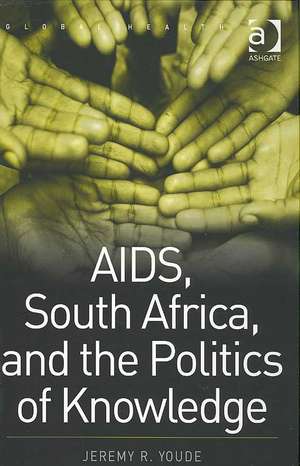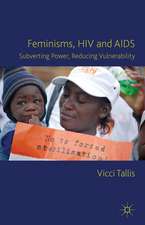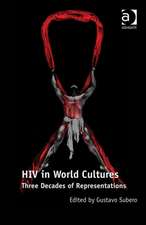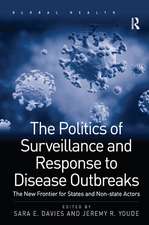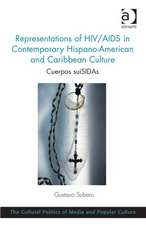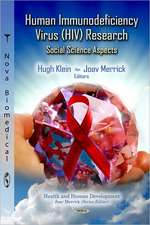AIDS, South Africa, and the Politics of Knowledge: Routledge Global Health Series
Autor Jeremy R. Youdeen Limba Engleză Hardback – 28 iul 2007
Din seria Routledge Global Health Series
- 9%
 Preț: 935.93 lei
Preț: 935.93 lei - 5%
 Preț: 271.79 lei
Preț: 271.79 lei - 30%
 Preț: 768.46 lei
Preț: 768.46 lei - 18%
 Preț: 1000.27 lei
Preț: 1000.27 lei - 27%
 Preț: 500.13 lei
Preț: 500.13 lei -
 Preț: 469.34 lei
Preț: 469.34 lei - 18%
 Preț: 1112.34 lei
Preț: 1112.34 lei -
 Preț: 446.15 lei
Preț: 446.15 lei -
 Preț: 469.34 lei
Preț: 469.34 lei -
 Preț: 469.34 lei
Preț: 469.34 lei - 31%
 Preț: 765.52 lei
Preț: 765.52 lei - 18%
 Preț: 1004.20 lei
Preț: 1004.20 lei -
 Preț: 382.18 lei
Preț: 382.18 lei - 14%
 Preț: 299.44 lei
Preț: 299.44 lei - 5%
 Preț: 310.16 lei
Preț: 310.16 lei -
 Preț: 386.57 lei
Preț: 386.57 lei - 5%
 Preț: 1095.42 lei
Preț: 1095.42 lei - 13%
 Preț: 330.94 lei
Preț: 330.94 lei
Preț: 997.11 lei
Preț vechi: 1215.98 lei
-18% Nou
Puncte Express: 1496
Preț estimativ în valută:
190.79€ • 199.22$ • 157.55£
190.79€ • 199.22$ • 157.55£
Carte tipărită la comandă
Livrare economică 15-29 aprilie
Preluare comenzi: 021 569.72.76
Specificații
ISBN-13: 9780754670032
ISBN-10: 0754670031
Pagini: 166
Dimensiuni: 156 x 234 x 21 mm
Greutate: 0.36 kg
Ediția:1
Editura: Taylor & Francis
Colecția Routledge
Seria Routledge Global Health Series
Locul publicării:Oxford, United Kingdom
ISBN-10: 0754670031
Pagini: 166
Dimensiuni: 156 x 234 x 21 mm
Greutate: 0.36 kg
Ediția:1
Editura: Taylor & Francis
Colecția Routledge
Seria Routledge Global Health Series
Locul publicării:Oxford, United Kingdom
Notă biografică
Jeremy R. Youde is Assistant Professor of Political Science at University of Minnesota Duluth, USA.
Recenzii
'Through its examination of epistemic and counter-epistemic communities, this book helps scholars of Africa and global health comprehend how the South African government could accept explanations about AIDS that challenge the mainstream international AIDS control regime. The book makes a valuable contribution to our understanding of the politics of AIDS by investigating how historical experiences and clashes of identity shape state responses to the disease.' Amy S. Patterson, Calvin College, USA 'Compelling and controversial, Youde’s timely book addresses a lacuna in the literature regarding the failure of certain nations to adapt effectively to the HIV/AIDS pandemic. He provides an intriguing take on the rivalrous behavior between competing scientific communities which helps to explain the curious and problematic patterns of South African decision-making in the face of the contagion. Ultimately Youde’s argument provides a means to transcend the bitter polemics that typically prohibit a sober discussion of the issues.' Andrew Price-Smith, Colorado College, USA and Co-Director, Colorado Consortium for Disaster Medicine and Preparedness, USA 'Youde's book is a welcome contribution to any real understanding of why the government of South Africa has adopted such a position on HIV/AIDS...On the eve of leadership change in South Africa and the shifting of international donor priorities to a more health-based approach to HIV/AIDS, this book is both timely and revealing.' Modern African Studies 'This is an important text...[for] understanding how public health concerns become politicized and the implications of that process for people who are HIV-positive...Youde has provided an excellent guide on how to "think about" HIV/AIDS research, practice and treatment as a global international political process. As such, this book will be of value not only to scholars interested in South Africa, but also to researchers from across the global north and global south seeking to
Cuprins
Chapter 1 Introduction; Chapter 2 Knowledge and International Policymaking; Chapter 3 Counter-epistemic Communities; Chapter 4 History and Public Health in South Africa; Chapter 5 Identity, AIDS, and Public Health in South Africa; Chapter 6 South African AIDS Policies and the Counter-epistemic Community; Chapter 7 Conclusions and Implications;
Descriere
Through an in-depth examination of the interactions between the South African government and the international AIDS control regime, Jeremy Youde examines both the epistemic and counter-epistemic communities to highlight the relevance and importance of Africa to international affairs. The study is ideally suited to scholars interested in African studies, international organizations, global governance and infectious diseases.
